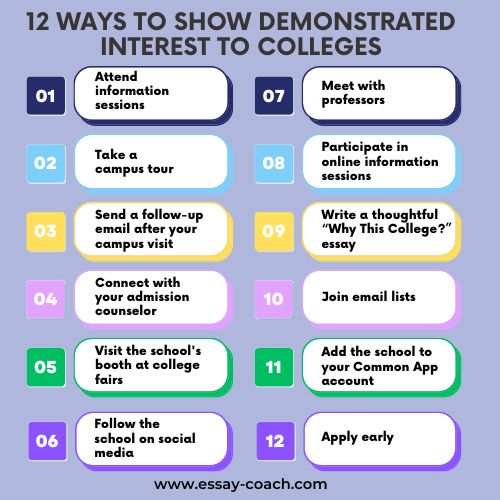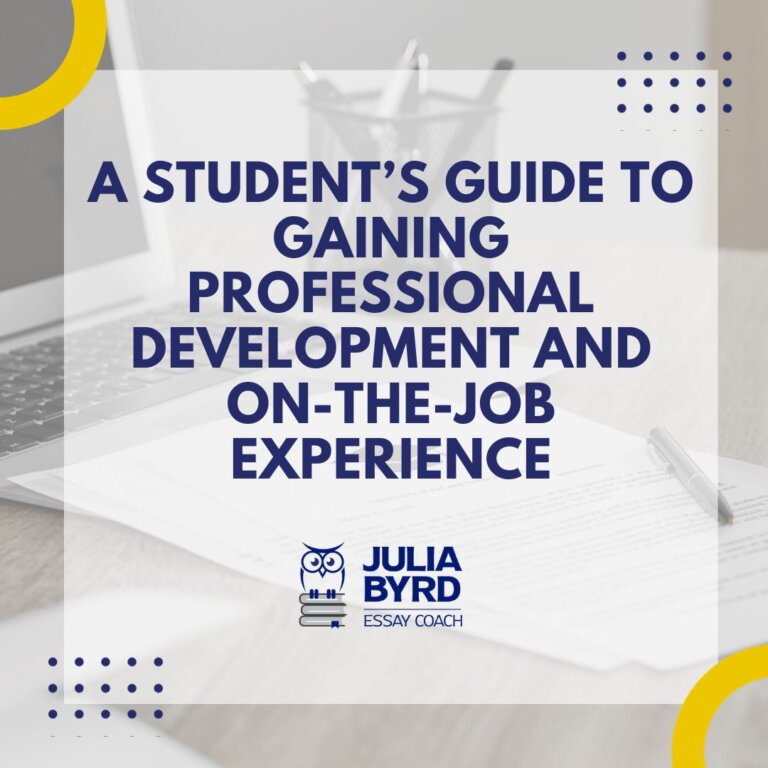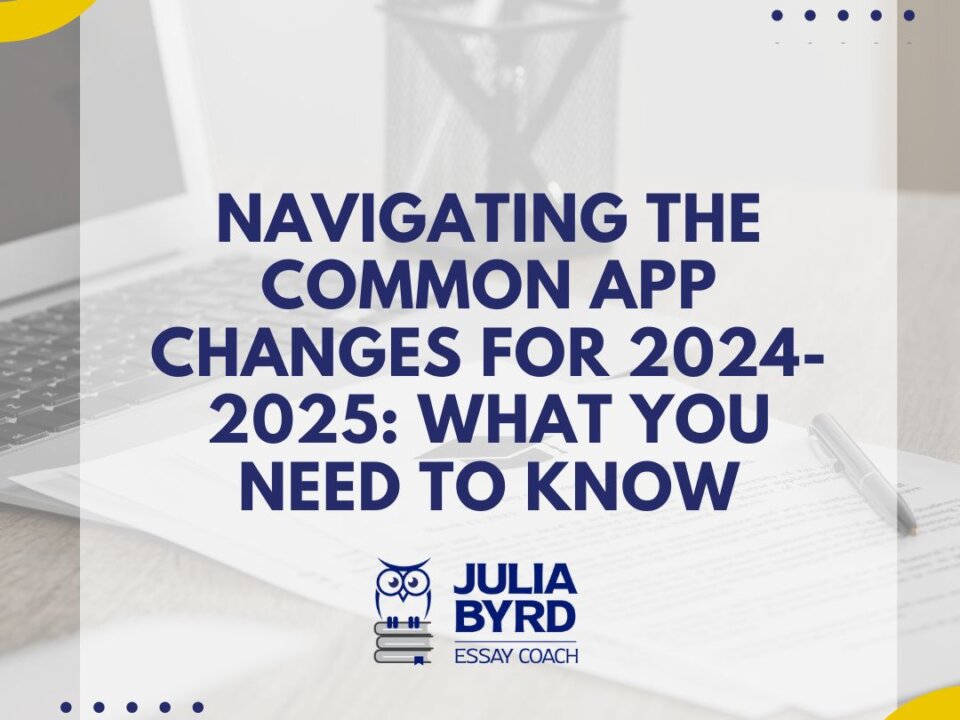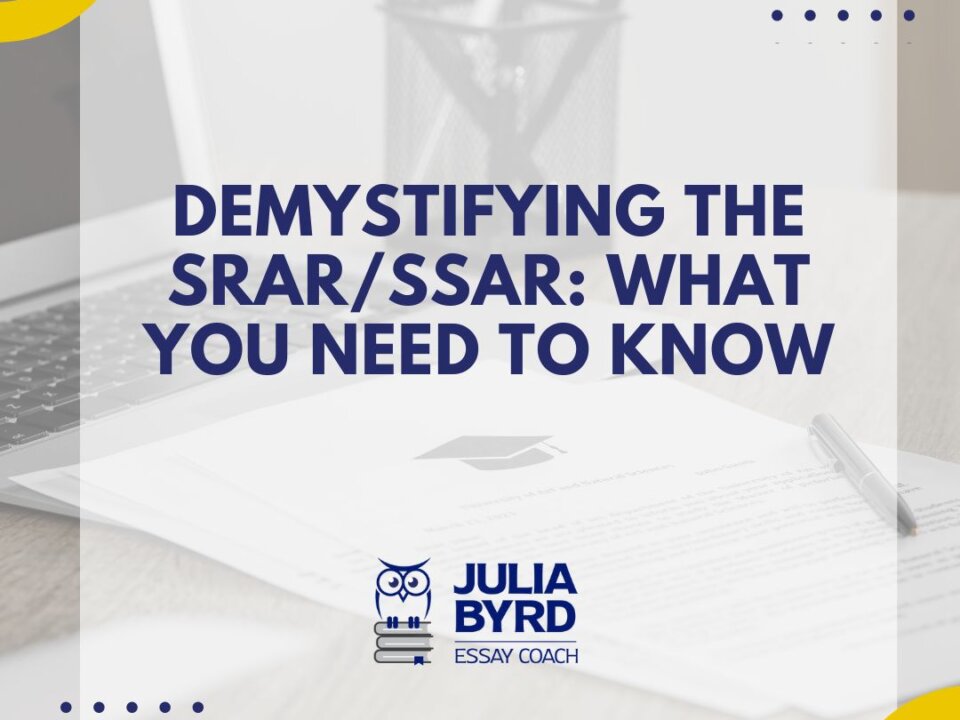Demystifying Demonstrated Interest for College Admissions: What It Is and Why It Matters


Reading time: 8 min.
Are you currently in the throes of the college application process and feeling a bit overwhelmed? (Or maybe you’re getting ready to tackle college applications in the next year or two, but you’re not sure where to start.) Do you find yourself Googling terms like “demonstrated interest” and “early decision” and wondering what the heck it all means — and what it means to you? Don’t worry. You’re not alone! In this post, we’ll break down one of those never-heard-before terms — demonstrated interest — and discuss what it is and why it’s important to your college application. The goal? Make you feel less stressed about college admissions and more empowered to tackle your applications head-on.
What Is Demonstrated Interest, Anyway?
First things first: what exactly is demonstrated interest? Essentially, it refers to how you can show a college you’re genuinely interested in attending. Colleges want students who have done their research, visited campus, attended information sessions, and engaged with the college in different ways. By demonstrating your interest in the college, you’re showing the admissions committee that you’re serious about attending and you’ve taken the time to learn more about what the college offers.
Does Demonstrating Interest Really Matter?
Sometimes. And for some colleges.
Here’s where things get a little more complicated. See, colleges are businesses. And like any business, they want to attract customers (in this case, students like you) who are likely to stick around for a while (not just for their four years of undergrad, but maybe also for post-grad studies and as an active alumnus).
That’s where demonstrated interest comes in: By showing a college you’re interested in attending, you’re signaling to them that you’re more likely to enroll if you’re admitted. And that, in turn, makes you a more desirable candidate.
It’s not unlike dating, if you think about it. You wouldn’t just sit back and hope that your crush would magically realize how amazing you are and ask you out (well, maybe you would, but it’s not always the most effective strategy). No, you’d probably try to drop some hints that you’re interested. Maybe you’d compliment them on their outfit or find a way to casually mention that you both love the same band. The point is: You’d be actively trying to demonstrate your interest in the hopes of increasing your chances of a successful outcome (i.e., a date).
It’s the same with colleges. You can’t just submit your application and hope for the best. You must actively demonstrate your interest in the school to increase your chances of admission.
But not every college wants to be courted. Well, at least, not all of them give you credit for trying to court them. One of the best ways to find out if a college tracks and considers demonstrated interest is by asking them (which, coincidentally, is also a way of showing interest) and by Googling “[School Name] Common Data Set.” Schools will indicate in this report whether this is something they consider when it comes to admission decisions.
But even if a school doesn’t officially track demonstrated interest, visiting the campus, attending college fairs, and contacting admission officers will give you a better sense of what the school is really like and whether it’s a good fit for you.
Don't think of demonstrated interest as you starting at 0 and trying to get to 100 by constantly showing your curiosity about a school. Similarly, a school isn't starting you at 100 and penalizing you every time you don't take advantage of a demonstrated interest opportunity. Think of it as a combination, where the school is giving you plenty of different opportunities to learn about a school.
13 Ways to Show Demonstrated Interest
Now that you know what demonstrated interest is and how to determine which schools consider it … how do you demonstrate it? Here are a few ideas:
-
- Attend information sessions. Most colleges offer information sessions for prospective students. Attending an information session is a great way to learn more about the college and to ask any questions you may have. It also shows the admissions committee that you’re interested in learning more about the college and what it has to offer.
- Take a campus tour. This is one of the most basic ways to show interest. By taking the time to visit the campus and learn more about the school, you’re showing you’re serious about your application and getting insight on what being a student there is like. Plus, you’ll get a feel for the campus culture and whether it’s a good fit for you.
- Send a follow-up email after your visit. After you’ve attended an information session or campus tour, consider sending a follow-up email to your admissions counselor or tour guide. Thank them for their time, and ask any additional questions. (Hint: Don’t ask them a question that can easily be found online. Dig deeper!)
- Connect with your admission counselor. Most colleges have admission counselors assigned to specific regions or high schools. These counselors can be an excellent resource for answering your questions and providing more information about the school. By reaching out to them and building a relationship, you’re showing that you’re invested in the process.
- Visit the school's booth at college fairs. College fairs are a great way to learn about different colleges and to meet with admission representatives or school alums — and it’s another great way to show you’re taking the college search process seriously.
- Follow the school on social media. This is a great way to stay up-to-date on the latest news and events at the school. Engaging with the school’s social media accounts (liking, commenting, sharing) displays your interest in what they have to say and excitement for engaging with their community.
- Meet with professors. If you have an idea about what you want to study and/or major in, set up an informational call or meeting (virtual or in-person) with a professor in that department. Ask them relevant, thoughtful, and authentic questions, and don’t forget to follow up with a letter or email thanking them for their time and information.
- Participate in online information sessions. Many schools offer online information sessions or webinars that let you learn more about the school without having to travel there. Participating in these sessions can show that you’re interested in the school and want to learn more.
- Write a thoughtful “Why This College?” essay. When you’re applying, many colleges will ask you to write an essay explaining why you want to attend their school. This is your chance to show off all the research you’ve done and explain why you’re a good fit for the school. A thoughtful, well-written essay can go a long way in demonstrating your interest.
- Join email lists. But don’t just sign up for communication from them — it’s important to actually read their emails and newsletters, click on the links, and spend time reading the website (yes, they can see what you’ve clicked on, where you visit on their website, and how much time you spend doing it). Many schools have an at-a-glance way to see what communications the school has sent to you since your very first interaction with them (and what you clicked on and responded to).
- Add the school to your Common App, Coalition App, or ApplyTexas accounts. Even if you’re not ready to apply just yet, consider adding your schools of interest to your application portal accounts. Schools will be notified once you add them, resulting in yet another measure of demonstrated interest.
- Apply early. When you are ready to apply, consider applying Early Action or Early Decision, if they truly are at the top of your list and it makes financial sense to do so (in the case of Early Decision). Showing your enthusiasm and willingness to commit can also give you an edge.

Basically, anything that shows you’re invested in a particular school can be considered demonstrated interest.
BONUS TIP:
- Log in to your admission portal regularly. Yes, schools can also see when you've logged in to your student portal.
Using Demonstrated Interest to Strengthen Your College Application
Colleges want students who are passionate about attending their institution. By demonstrating your interest in the college, you’re showing the admissions committee you’re a serious candidate and that you’re likely to enroll if accepted — and it also helps you learn more about the college and whether it’s the right fit for you.
Demonstrated interest can make a difference in the admissions process, so don’t underestimate its importance. With a little effort and determination, you can show a college that you’re the right candidate for their institution and increase your chances of getting accepted.
The good news is that showing your interest doesn't need to take a lot of time, effort, or money. It can be as simple as clicking through emails or asking a genuine question to an admission officer.
Demonstrated interest is also not the only piece of your admissions puzzle. Contact me if you’d like to discuss the importance of personal statements — and the supplemental “Why Us” essay — in your application.








